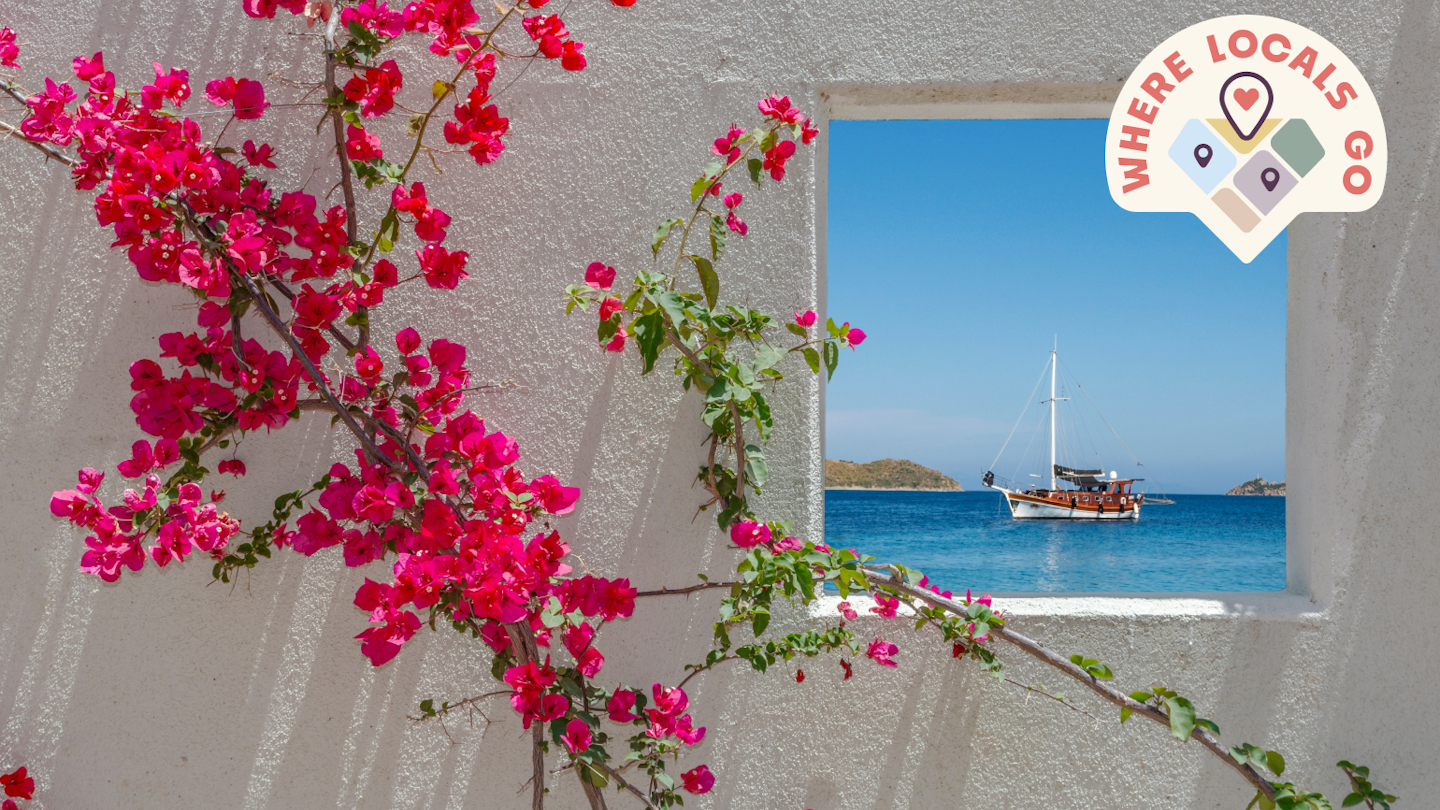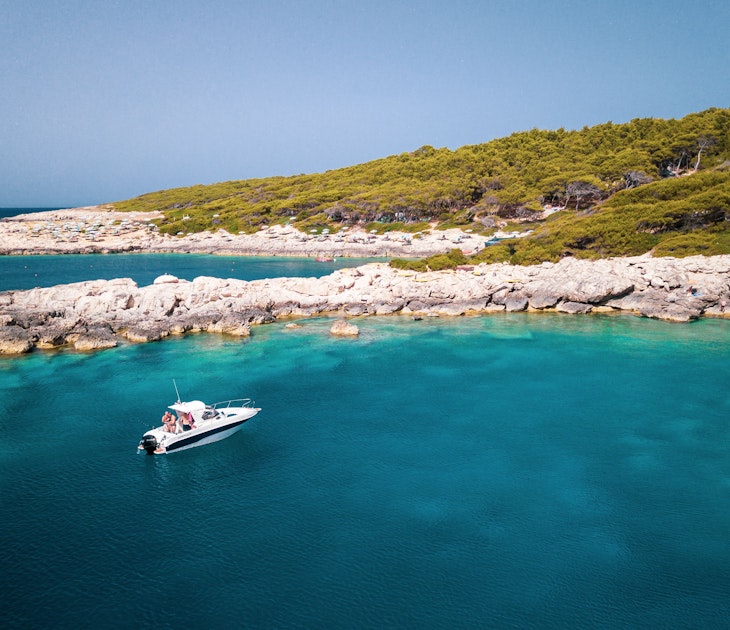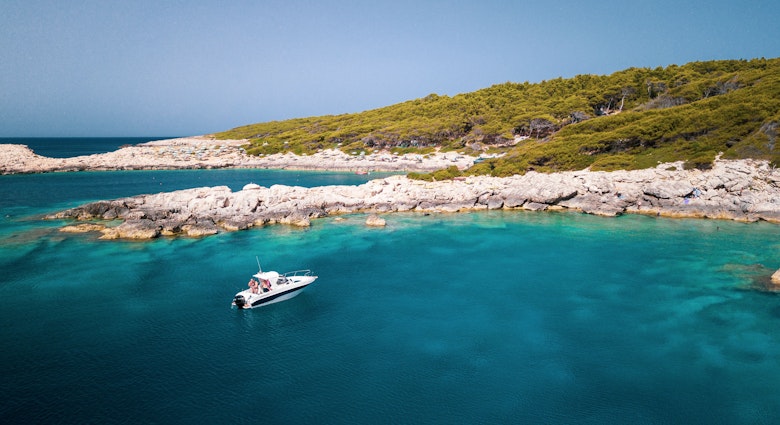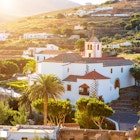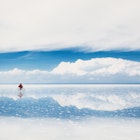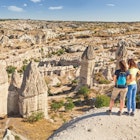Türkiye's appeal lies in so many places, from Istanbul's iconic attractions like Hagia Sophia and the Blue Mosque to the sun-soaked beaches and bazaars of Izmir and the otherworldly Cappadocia, with its cave hotels and hot air balloon rides. With such diverse choices, deciding where to start your Turkish adventure can be tricky. But where should you head if you're seeking to experience a more laid-back Türkiye through the eyes of the locals?
While most tourists gravitate towards the Mediterranean coast's glamorous resorts, heading north along the picturesque Aegean coast bordering Greece unveils hidden gems cherished by Turkish holidaymakers. Here, you'll stumble upon bougainvillea-draped villages, wineries, historical treasures and stunning coastlines.
If you've ever wondered how to holiday like a local in Türkiye, let three of our experts show you the spots you can bookmark for next year's summer trip.

An Aegean island idyll: Bozcaada
Jennifer Hattam is a journalist who calls Istanbul home.
Caressed by the cooling winds blowing over the Aegean Sea, the island of Bozcaada sits just five miles off Türkiye's northwestern coastline, a mere half-hour ferry ride from the mainland but still remote enough to have retained much of its natural beauty and laid-back charm.
Travelers arriving in the picturesque harbor are greeted by an imposing fortress that attests to a long history of inhabitation on the island. I like to stay in the nearby old Greek Quarter, an atmospheric, walkable neighborhood now rife with restaurants, cafes, boutiques, and small hotels like the cozy Mitos Otel. As you wander the narrow backstreets, keep an eye out for the eclectic local history museum in a 19th-century stone house.
Though prices and the island's popularity among Turkish visitors have increased, it's hard not to eat and drink well on Bozcaada. Tiny Ada'm ("My Island") serves creative, delicious seafood and vegetable meze (sharing plates), while local wineries like Talay, Corvus, Çamlıbağ, and Amadeus have tasting rooms open to the public. Browse the open-air market near the harbor for homemade jams, hand-dried herbs, and other edible souvenirs.
I like to work up an appetite swimming at sublime Sulubahçe Plajı, while more adventurous sorts can kitesurf at long, windswept Çayır Plajı, just two of the island's many fine beaches. This is the kind of place where languid days are best spent without much of an agenda, but the lively Bozcaada Jazz Festival and the annual grape harvest (Bağbozumu Festivali) in the late summer provide bonus reasons to make a visit.

Türkiye's largest but quietest island: Gökçeada
Ömercan Kaçar is a travel, culture and history writer from Istanbul.
I used to find island holidays somewhat uninspiring until I stumbled upon Gökçeada, Türkiye's largest island. Nestled at the entrance of the Gulf of Saros, just west of Gallipoli, this gem recently lured me from Istanbul with its promise of tranquility and clean, windswept beaches.
While Gallipoli has long been a popular tourist destination, Gökçeada remained somewhat under the radar until recent years when Turkish families discovered its peaceful allure for their vacations.
The journey here is a pleasant 1.5-hour sea bus or ferry ride from Çanakkale. As you step onto this island with pristine bays and beaches, you'll understand precisely why Gökçeada translates to "heavenly island." Among the array of stunning coastal spots, two beaches stand out for me for their crystal-clear waters: Kefalos and Uğurlu. Secluded Kefalos Bay, in particular, with its windwhipped waters is a haven for those who like watersports like windsurfing and kitesurfing.
The Aegean is generally the least developed coastline and on Gökçeada, you'll find a host of family-run pensions (guest houses). For an authentic island experience that resonates with its character, consider staying at the Agios Hotel, a charming family-owned establishment with stone architecture that reflects the island's laid-back but welcoming spirit.
However, what truly sets Gökçeada apart is its rich Greek-Turkish shared history. It's even the birthplace of Archbishop of Constantinople Bartholomew I, who hails from the village of Zeytinliköy on the island. As you explore the villages, you'll immerse yourself in a unique culture where Turks and Greeks coexist harmoniously. When you visit Bademli village with its traditional homes adorned with floral window boxes, stop by the open-air Sunday market and then, for dinner, head to Gün Batımı Restaurant. You can enjoy a fresh seafood dinner while watching the sunset in this lively spot.

The quieter side of the Med: Akyarlar
Ismet Esroy is a travel guidebook writer living in Izmir.
My family owns a small timeshare, so I've been going to Akyarlar in the Bodrum Peninsula for over 20 years. While there's nothing "off-radar" about Bodrum Town per se, particularly for Turkish and northern European holidaymakers, Akyarlar is the peninsula's more laid-back region—an escape route for those who want to have a relatively peaceful holiday in Bodrum without being affected by the crazy summer crowds of the city.
Surrounded by the Aegean Sea's aqua waters, you can swim at various spots in the district. Karaincir, Akçabük, and Meteor are the most well-known beaches in the area and some of my favorites because the water is so clear and there are usually activities like kayaking and boat tours. The boat tours typically start in the morning and run through the evening, allowing you to enjoy different bays of the region.
Akyarlar offers several lodging alternatives which suit a range of budgets and tastes. For instance, Xanadu Island offers upscale lodging, while La Brezza Suite & Hotel offers lower-budget accommodation. No matter your choice, you'll find that the sea will always be just a step away.
Speaking of recommendations, my first choice for food in Akyalar would be Samsun Pidecisi Nuri Usta. With its appetizing Black Sea region-style pides (sometimes referred to as Turkish pizza), locals have always preferred this restaurant. My favorite pides are "Kapalı Kıymalı" (pide with minced meat) and "Açık Pastırmalı" (pide with pastrami).



